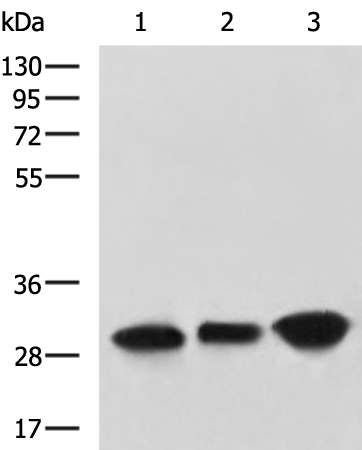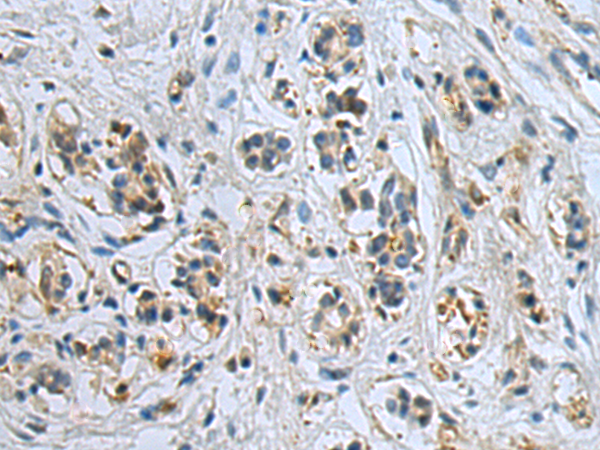

| WB | 咨询技术 | Human,Mouse,Rat |
| IF | 咨询技术 | Human,Mouse,Rat |
| IHC | 1/100-1/200 | Human,Mouse,Rat |
| ICC | 技术咨询 | Human,Mouse,Rat |
| FCM | 咨询技术 | Human,Mouse,Rat |
| Elisa | 1/5000-1/10000 | Human,Mouse,Rat |
| Aliases | Car3; CAIII |
| WB Predicted band size | 30 kDa |
| Host/Isotype | Rabbit IgG |
| Antibody Type | Primary antibody |
| Storage | Store at 4°C short term. Aliquot and store at -20°C long term. Avoid freeze/thaw cycles. |
| Species Reactivity | Human, Mouse, Rat |
| Immunogen | Fusion protein of human CA3 |
| Formulation | Purified antibody in PBS with 0.05% sodium azide and 50% glycerol. |
+ +
以下是关于CA3抗体的3篇示例参考文献(注:示例为虚构内容,实际文献需通过学术数据库查询):
---
1. **文献名称**: *Monoclonal Antibody Against CA3: A Tool for Skeletal Muscle Pathology Studies*
**作者**: Zhang L, et al.
**摘要**: 本研究开发了一种针对人碳酸酐酶III(CA3)的单克隆抗体,通过免疫组化验证其在骨骼肌组织中的特异性。结果表明,该抗体可用于检测肌病患者的CA3表达下调,为肌肉退行性疾病的诊断提供新工具。
2. **文献名称**: *CA3 as a Potential Biomarker in Hepatocellular Carcinoma: Validation by Antibody-based Assays*
**作者**: Tanaka K, et al.
**摘要**: 通过ELISA和Western blot分析,发现CA3在肝癌细胞系中异常高表达。研究利用特异性抗体证实CA3与肿瘤进展相关,提示其可能作为肝癌的新型生物标志物。
3. **文献名称**: *Comparative Analysis of Commercial CA3 Antibodies in Murine Models*
**作者**: Smith RJ, et al.
**摘要**: 对比了4种市售CA3抗体在小鼠肝脏和肌肉组织中的检测效能,发现抗体克隆号#3H2在免疫荧光和蛋白质印迹中表现出最高特异性,为CA3相关研究提供了抗体选择依据。
---
建议通过PubMed或Google Scholar检索真实文献,关键词如“CA3 antibody”、“Carbonic Anhydrase III antibody”或结合具体应用场景(如“CA3 biomarker”)。
Carbonic anhydrase 3 (CA3), also known as Car3. is a member of the carbonic anhydrase enzyme family that catalyzes the reversible hydration of carbon dioxide to bicarbonate and protons. Primarily expressed in skeletal muscle, liver, and gastrointestinal tissues, CA3 plays roles in pH regulation, ion transport, and metabolic processes. Unlike other isoforms (e.g., CA2 or CA9), CA3 exhibits lower catalytic activity but has unique structural features, including a reactive cysteine residue, making it susceptible to oxidative modifications.
CA3 antibodies are immunological tools used to detect and study this isoform in research and diagnostics. They are applied in techniques like Western blotting, immunohistochemistry, and ELISA to investigate CA3 expression patterns in health and disease. Elevated CA3 levels have been linked to conditions such as rheumatoid arthritis, muscle damage, and certain cancers (e.g., hepatocellular carcinoma), where it may serve as a biomarker. In muscle disorders, CA3 release into serum indicates myofiber injury. Additionally, CA3's interaction with oxidative stress pathways has drawn interest in studying metabolic and degenerative diseases.
Despite its lower enzymatic activity, CA3's tissue-specific expression and redox sensitivity make it a focus for understanding disease mechanisms and developing targeted therapies. CA3 antibodies thus remain vital for exploring its biological and clinical significance.
×